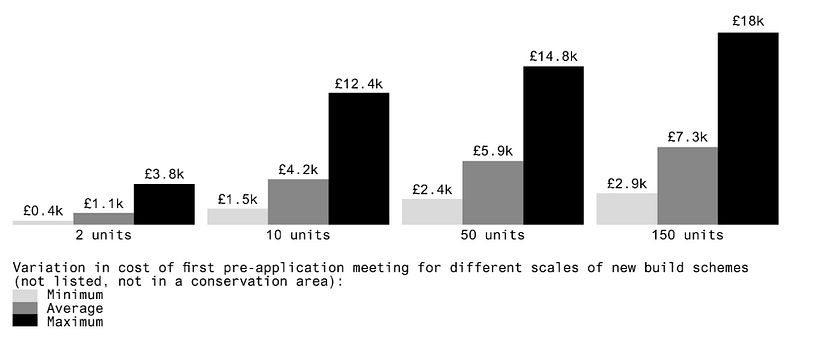In the intricate landscape of urban development and construction projects in the UK, the significance of well-informed decision-making cannot be emphasized enough. The early phases of any development pursuit lay the groundwork for its triumph, yet a recurring hurdle often emerges in the form of prolonged processing times for pre-application advice from local councils. Termed as "pre-app advice" or "pre-planning advice," this indispensable resource acts as a guiding beacon for architects, developers, and investors, steering them through the intricate regulatory maze while fine-tuning their proposals.
A central challenge, however, resides in the extended duration it takes to obtain this advice, potentially impeding project momentum. To address this, the strategic integration of digital planning tools comes to the fore. In this article, we delve into the pivotal role of pre-application advice in smoothing the planning process, fostering collaborative efforts, and propelling projects towards approval.
Join us as we unearth the intricacies of this indispensable tool and explore how leveraging digital planning tools can proactively prepare for pre-app advice meetings, expediting the journey from vision to fruition.
What pre-app advice services are offered by councils?
In the UK, local councils utilize the 'pre-app advice' process for any actions, consultations, or guidance sought prior to submitting a formal planning application. This preliminary stage encompasses both paid advisory services and interactive engagements, such as in-person or phone-based consultations with local planning officers. These fee-based pre-app advice services offered by councils coexist with various other initiatives, including engagement with stakeholders and the community.
A good pre-app advice service can resolve critical design decisions early and establish a productive working relationship with the local council. In other cases, it can also identify if a project is unlikely to receive consent easily.
Benefits of pre-application advice services can include:
Example: Nottingham City Council pre-application advice service
With the introduction of design codes, an expanded pre-app process with the local authority that includes design reviews is an ideal mechanism to improve the quality of designs, particularly on challenging sites. For example, the Nottingham City Council’s Design Quality Framework and pre-app process is an exceptionally well-developed example.
Applications that undertake pre-application consultation in Nottingham take ten weeks less on average to get planning approval compared to planning applications that don't make use of the service. They result in eleven fewer planning conditions than applications that don’t engage in the council's pre-application process.
Consider the cost vs benefit of pre-application advice |
In evaluating guidance from local authorities, it's crucial to factor in the expenses tied to the pre-app advice service. These charges fluctuate depending on the scope of the project and the specific local authority overseeing the application process.
Public Practice, a social enterprise focused on building public sector capacity for proactive planning, recently reviewed pre-application services provided by London Borough Councils.
The analysis highlighted notable discrepancies in both cost and service offerings pertaining to pre-app advice among different planning authorities. Below, you'll find the average expenses associated with projects of varying scales.

Overview of the average costs for an initial pre-application meeting with the local authority for projects of different sizes (Source: Public)
When you contemplate pre-application advice services of a local council, solicit a secondary evaluation of the service's quality for somebody who has used the service. This step allows for an informed assessment of whether the extra cost is justified.
Alternatively, insights from data-driven place analytics tools, such as PlaceChangers Site Insights tool, can cross check capacity issues of local services and assets. You can also seek initiating discussions with local councillors and residents can serve as an initial step to engage in dialogues concerning crucial planning matters.
Common Challenges in the Pre-App Advice Process
Time delays are a key stumbling block for most pre-application advice services. Euqually, the quality of the pre-application advice service can differ significantly between local authorities. Local authority resources can be substantially stretched, and often even internal departments cannot jump the queue for advice from planning officers, and specialists in councils may take time to revert answers. Lastly, it is not always guaranteed that council representatives will have first hand on-site experience with the site you are working on.
Public Practice also listed key issues that local authorities face when it comes to pre-app services.
In most cases, design teams should anticipate potential delays when awaiting formal pre-application advice. Seeking pre-application advice is expected to extend the project timeline by a minimum of two months, without factoring in any adjustments prompted by the advice itself. However, this investment in time can be balanced by a reduction in complications during the planning application phase.
Making the most of pre-app advice services
Do a baseline investigation before approaching the council. Before you consider applying for your pre-app advice with the local authority, research the area around your site in your own time with available data, ideally also incorporating insights from local people and organisations. This can be accelerated by powerful place analytics tools, such as PlaceChangers Site Insight.
The pre-application advice process is unlikely to be beneficial without a baseline investigation of the site to get a feel for what is possible.
The government advises as follows:
“The level of information necessary for effective pre-application engagement will vary depending on the scale and nature of the proposed development. [...] A prospective applicant would not necessarily be expected to provide all of the information that would accompany a formal planning application, but it needs to be sufficient information to allow the local planning authority to take an informed view.” https://www.gov.uk/guidance/before-submitting-an-application
Try to do the following to support your pre-application process with the local council.
Utilizing pre-app advice services offered by councils is a valuable strategy for enhancing your planning application. It's essential to verify the resident and community consultation prerequisites and organize an engaging community consultation session to discuss layouts.
Read more here: When is early community engagement required for planning applications?
Maximizing Preparation for the Pre-App Advice Process through Digital Tools
In conclusion, navigating the realm of pre-application advice with local councils in the UK requires a strategic approach. While challenges like time delays and resource limitations persist, embracing digital planning tools can offer a proactive solution.
By investing in these tools and fostering effective communication with local authorities and communities, developers and architects can streamline the process, enhance collaboration, and pave the way for more successful and efficient planning applications. The journey from concept to approval is undoubtedly complex, but with the right tools and insights, it becomes a path paved with greater clarity and potential.
The PlaceChangers platform provides a suite of digital tools that aid the design team during the pre-app phase using interactive proposal maps.
The place report from PlaceChangers Site Insight provide a detailed overview of the provision of social facilities and the local population's makeup, which helps consider travel and green space requirements. It provide an excellent starting point to generate real-world insights at the pre-app stage.
With PlaceChangers interactive consultations you can invite feedback from the local planning authority, residents, and other stakeholders as part of a interactive consultation programme.
Explore the PlaceChangers planning toolkit

PC Engagement - market leading planning engagement
Set up powerful interactive consultations and integrate on your proposed site layouts.

PC Site Insights - Location insights tool
Make use of real-world location data and enrich your community engagement planning with insights on local people.
